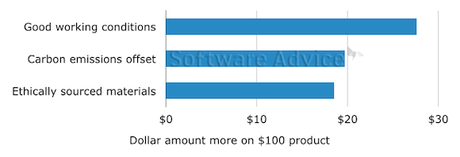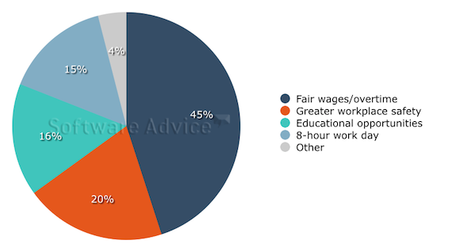Loss of profits and market share, diminishing brand reputation, and costly fines threaten companies that do not meet the international standards of ethics. As evident in the wake of scandals involving top brands such as Apple and Nike for example, today’s consumers are becoming better educated about overseas working conditions and the unfair treatment of workers.
As corporate social responsibility (CSR) has risen as a top priority in operations and supply chains, Software Advice, affiliated with Garner – one of the world’s leading information technology research and advisory companies – investigates “which link in the [supply] chain consumers claim to care about most.” In this report examining how corporate social responsibility impacts purchasing behavior, Software Advice assessed consumers’ willingness to pay more for ethical products. Three separate phases of surveys polled a nationally representative dataset of approximately 385 respondents.
In one survey, Software Advice asked three different groups of consumers how much more they were willing to pay for a product, normally priced at $100 that was produced more ethically with respect to a particular link in the supply chain: raw materials, manufacturing, and distribution. Respondents indicated that they would pay an average of $18.50 more if the raw materials were ethically sourced and as much as $27.60 more for a product that was made in good working conditions.

The survey found that approximately 65 percent of the respondent group was willing to pay more for a product made under an ethical initiative – be it good working conditions, carbon emissions offset, or ethically sourced materials.
As events such as the garment factory collapse in Rana Plaza, Bangladesh, raised global awareness of the realities that workers face in terms of poor labor conditions, the survey’s clear inclination by consumers to pay more for products manufactured in good working conditions promoting workplace safety is hardly surprising. The breakdown of labor efforts indicated that fair compensation/overtime pay and workplace safety were most imperative to consumers.

However, as raised by The Economist, “the disaster in Dhaka shows how hard it is to claim that your products are ‘ethically sourced.'” Given the scope and complexity of most global supply chains, a sincere and continued commitment to corporate social responsibility for multinationals goes beyond a simple check of a building certificate. Initial risk assessment and review of a firm’s code of conduct are only preliminary elements composing a robust compliance program – which should also include education and training, monitoring and auditing, reporting and investigating, discipline, and incentives.
“Monitoring is an ongoing, constant assessment of the quality of the internal control system’s performance over time with the aim of continual improvement,” emphasizes the Center for International Private Enterprise (CIPE) in Anti-Corruption Compliance: A Guide for Mid-Sized Companies in Emerging Markets. “As the business environment keeps changing, compliance risks and challenges evolve as well and necessitate adjustments.”
Forrest Burnson, market researcher at Software Advice, underscores that “while supply chain managers and logistics professionals might only see themselves as one small element of a larger operation, it’s important for them to consider the impact that their operations can have on the world. They are often a firm’s eyes and ears on the ground. While they can’t always make executive decisions, they can leverage their business and financial sense to determine where they can make improvements that not only produce a return on investment but also are the right thing to do.”
Coupled with the customer appeal of ethical supply chains demonstrated by Software Advice’s report, this is more evidence that ethics is a good investment.
Stephanie Bandyk is a Program Assistant for Global Programs at CIPE.

